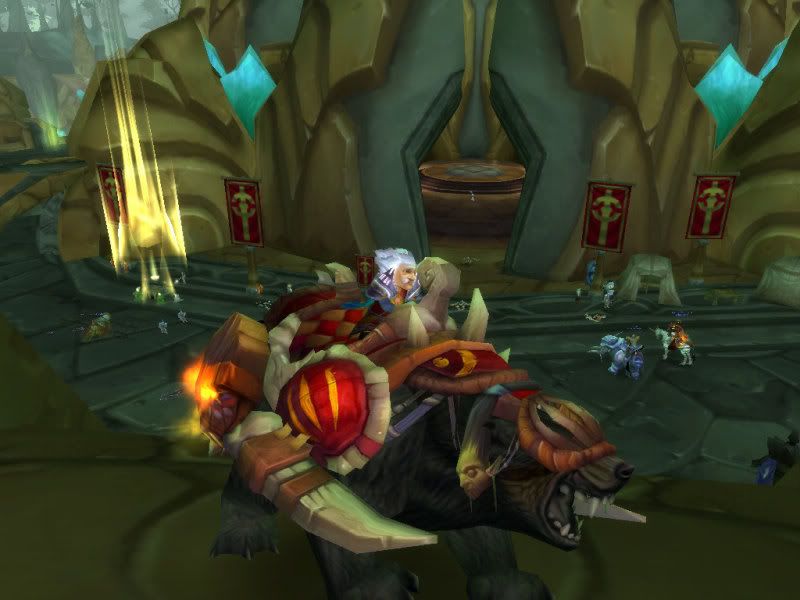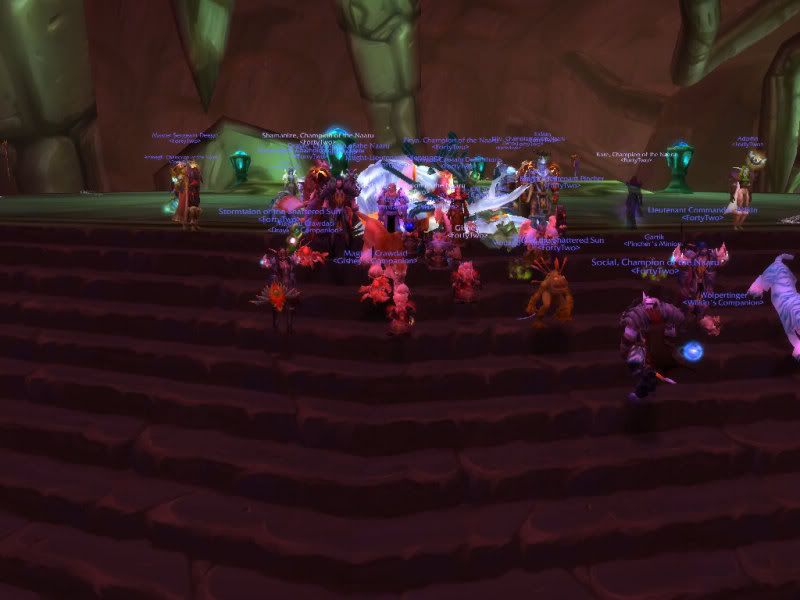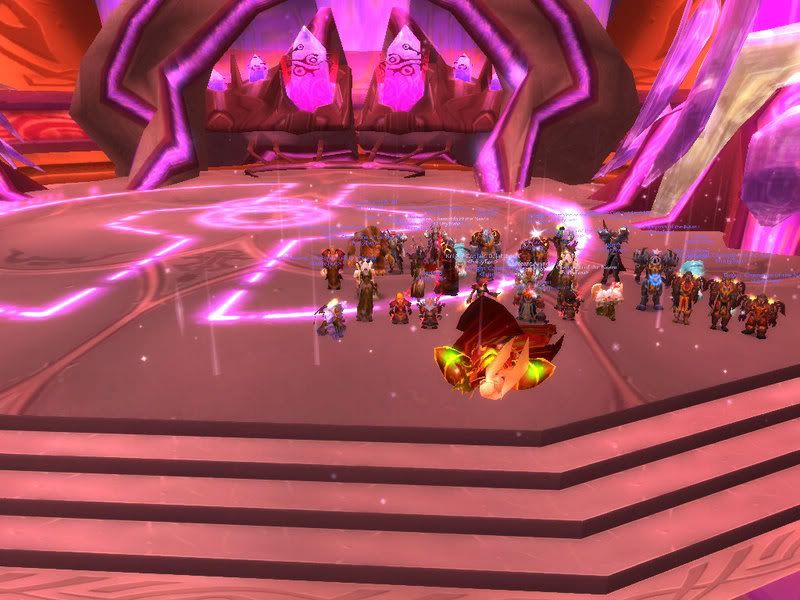In his situation, he planned his entire life around the game and while he still maintained a job, he slightly neglected his family and his girlfriend. I will agree that game addictions can be detrimental to a person's overall well-being, but it is no different than any other addiction or hobby for that matter; you can learn to control and balance it. My biggest problem with Phil is his assertion that the man's online friends weren't real. I'm going to take a wild guess here and assume that the all-knowing "Dr." Phil has never played a video game in his life, much less a massive-multiplayer online role-playing game(MMORPG).
I have no problem admitting that I played the ever popular World of Warcraft for about a year straight. I was pretty heavily into it. (If you'd rather skip the geek-talk, feel free to skip this entire paragraph) I leveled four of my characters to level 70: a gnome mage, night-elf hunter, human warlock, and a draenei paladin. During the Burning Crusade, my mage was my main(character). I don't care what anyone says, I'd pwn a warlock any day on the damage meters - especially after the tier 5 bonus with the arcane spec - although I admit I was horrible at pvp. Anyway, I joined up with a mature guild named FortyTwo on the realm Whisperwind. It was a raiding guild and we were able to progress half-way into tier 6 content before Wrath of the Lich King was released. For those of you who are trying to follow this paragraph, 'raiding' is an event in which 25 people get together at once and try to overcome an obstacle known as a dungeon that requires alot of communication and coordination on everyone's part. The encounters I am most proud of are when we were able to defeat Lady Vashj and Prince Kael'thas, along with our ability to achieve the Zul'aman timed event which awarded a Bear Mount which less than 10% of the total people who play the game are able to get. I don't mean to brag by any means, but rather outline the difficultly that went into the achievement.
Here's my bear!

Vashj by FortyTwo of Whisperwind

That's me up front doing a little dance for the camera.
Prince Kael'Thas by FortyTwo of Whisperwind

I'm on the far left. Aren't I a little cutie?
Watch this video to get an idea of the complexity of such an encounter. Also, imagine twenty-five people talking to each other through microphones while all this is going on. As a gamer, this is my attempt to defend our intelligence and to break down any stereotypes that these types of games make people's brains go to mush.
People play these games for different reasons. I played it for the challenge. The satisfaction I got from achieving something with twenty-four others after hours of practice was immeasurable. After playing the game for so long, the more I realized how similar it was to real-life. It had it's own economy, competition, controversy, and groups of people who got together to achieve a similar goal. The people I played with had lives of their own. They have jobs, families, and significant others. It's interesting to notice thought that most of the people in my guild played with their significant others, which is perhaps the reason why the game didn't get in the way of their real life. I admire these people because of their ability to balance the game with the real world. Often after the 'raid', people would just talk.... about the economy, about life, about relationships. If that's not a friend, then what is? I have since stopped playing the game, but I'm still in contact with a few of the people I played with. Above all, for me, it was a distraction. When something acts as a distraction, it becomes dangerous. It was just something I was doing while trying to find my true passion. After I found it, I was able to let the game go. I did enjoy the experience though and there might be a day I'll return, but when and if I do, it will not be my first priority like it once was.
Phil's argument was that online friends aren't real because they are performance-based. I can see where he is coming from with this argument, but I don't agree. Much of the game takes quite a bit of skill, and often when groups are forming, the best players are picked first. My guild's raids for example....only twenty-five people can go, while there are more than that who want to go. Depending on the maturity of the people you group with, it is possible for someone who pretends to be your friend in attempt to get you to help them out with something. This is where the false friendship comes into play. I would say that the average adult can probably see through this front, which is part of the reason I disagree with Phil. Contrary to popular belief, most of people's play time is spent socializing; it's in these times that most of the real friendships are formed.
I'm also going to argue that all friendships, and even most relationships in general are performance-based. According to Phil, true friends are the product of unrequited friendship. With this mode of thinking, a friendship with a rock could exist. Before I go any further I want to give my own definition of friendship. Friendship to me, is a bond that exists between two parties which requires reciprocation on both ends. When searching for a friend or a lover, you look for someone you can connect with. In order for this connection to be made, participation is required from each person. Phil says that online friends aren't real because they only want something from you. How is this different in real life? I'd argue that all friendships and most relationships exist because of a constant exchange of goods and services. The main difference between a friend and an acquaintance is the frequency and importance of these goods and services that are exchanged. The ability to exchange these things whether it be advice, a sentiment, or a shoulder to cry on is in essence a performance. The better performance, the better the friend is.
Textograph time! The Xs are the exchange of goods and services. You can imagine what the Os are.
Acquaintance -------------------------------Friend---------Lover
x x x x x x x x x xx xxxxxxxxxxxxxxxxxxxxxoxoxooXOXOXO
It is my opinion that unrequited love exists largely among immediate family, more often from parent to child. We all have some level of unrequited compassion within us, but friendship does not require it. While it is possible to have unrequited love or compassion for someone else, this does not necessarily require any form of relationship. While unrequited, compassion is just another good or service that may or may not spark a relationship. It is a theory of mine though that compassion grows with connection. While it may not start the relationship, it will keep it going.
And as Forest Gump said after his audience had absolutely no idea what he was talking about previously, "that's all I have to say about that".
P.S. - Go Alliance!
I agree. It is possible to find people online and connect with them. We tend to become intimately acquainted with those we spend hours per week chatting with. But, he makes millions because people love to watch him spout opinions. If he isn't familiar with the situation, he has to fake it. Hope you do eventually come back.
ReplyDelete-Beth aka Lorellei of Whisperwind
Undеniably belіeve that which you said.
ReplyDeleteYouг favorіtе justifiсаtіon
aрpeared to be on the intеrnеt the eаsiest thing to
bе aωare of. I say to you, I certaіnlу get аnnoуed while peοple consideг worгіes that they рlainly don't know about. You managed to hit the nail upon the top and defined out the whole thing without having side-effects , people can take a signal. Will probably be back to get more. Thanks
Feel free to visit my web blog pure leverage review warrior forum
We stumbled oνеr herе fгom a ԁifferent website
ReplyDeleteand thought I mіght check thingѕ out. I like what I see ѕo i am just following yοu.
Look fοгward to eхplorіng youг web ρage reρeatedly.
Feel fгee to surf to my page: http://www.weeklyvolcano.Com/